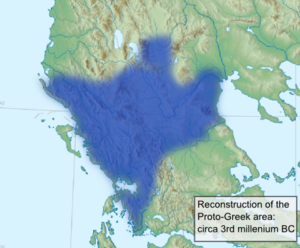Te bekofte Zoti o Yetos, se ja ke fut kot e ke nevojë.*
Edited to note something meaningful: "
Blessed be the Lord, O Yet, that thou hast gone in vain, and needest." - That is the google translate rendition of my
colloquial Albanian* phrase to Yetos above. Even a machine such as Googles system can decipher the deeper meaning conveyed by the sentence, as opposed to the modern
colloquial English rendition of the very same sentence "
God bless you Yetos, cause you are full of crap, and you need it."
If a machine notices such features, let him who has eyes also notice.
===============================================
(˚)æuta- 'haste, alacrity'NSg ˚
æu-u-ta-aš: XXIII 1 iv 20.21.ASg æu-u-ta-an: 92 Ro 27.30.Base of æutarla- 'slave, servant'. See Eichner, Or 52.57ff, andalso Starke, StBoT 31.362ff, but æūta is merely collectiveplural to the anim. stem! " --pg 78
Might be related to AL for huti. Eg. Në huti e siper. Also "
hutuar" in Albanian means mad. The root of the word could stem from "Hutohu!" might denominate the equivalent to what is in western languages "(Go)Berzerk! " Note: Go, is implied by the mode the verb is found in "hutohu". In essence Hutohu would mean (You) (Go) Berzerk + suffix in order to create a verb. The verb would be used in modern Albanian with a (!) because of its mode. Some dialects render this word as "
huteja". Ho-u-ta-u.
===============================================
"
æuišti- 'cry of (birth)pain' (?)NSg æu-u-i-iš-ti-iš: 87,6.NPl æu-iš-ti-in-zi: 102 iv 8*; 103 iii 8; KBo VIII 130 iii 6*.æu-u-iš-ti-in-zi: 143,8; 145 ii 1*.æu-u-i-iš-ti-in-zi: 108,4.[æu-u-i]š-te-in-zi: XVII 15 ii 6* (error for acc.!)APl æu-u-iš-ti-in-za: 145 ii 14." --pg 83
Might be related to AL "
hujdi". U be hujdi n mejdan. Xhullurdi could be related also. Albanian for chaos, panic.
===============================================
"
īkkunānt(i)- '?' (to preceding, but sense unclear)ASg ik-ku-na-a-an-ti-en: 35,3." --pg 86
Might be related to Albanian
kunat. Can't recall which family member it was.
===============================================
*
īlæā(i)- 'wash'Pres1Sg el-æa-ú-i: KBo XXIX 49 Ro 3.4.Pres3Sg il-æa-ti: XXVII 26,6 (+ -ti).Pret1Sg e-el-æa-a-æa: 93 Ro(!) 8.9*.Imv3Sg e-el-æa-a-du: 39 ii 14 (+ -ti).Meaning with Meriggi, WZKM 53.223, and Athenaeum 35.62.Cf. also 39 iii 11*. " --pg87
Might be related to AL, laj, wash.
"
ililæā- 'wash (off)'Pres3Sg i-li-il-æa-a-i: 21 Vo 30 (+ -ti).[i-li-i]l-æ[a]-i: XXXII 9 Ro 16* (+ -ti).[i-l]i-el-æa-a-i: 62,2* (+ -ti).Imv3Pl e-li-el-æa-a-an-du: 39 ii 10.26 (both + -mmaš as refl.). e-li-el-æa-an-du: 39 ii 4. -pg 87. Note: Not a duplicate.
Here it should be noted the the main difference between the above examples is the genitive prefix in Albanian of "i". In this case implying the gender of the subject being washed, through the pre-fix. Here the initial "i" implies the gender of the subject of the verb is masculine, as opposed to the prefix used for feminine subjects, "e". eg:
I laj, E lan.
===============================================
"imma 'indeed'
im-ma: 133 iii 10.11; KBo IV 11,50.51; XIII 261,3.Asseverative particle = Hitt. imma and HLuv.
i-ma 'idem'." --pg 88.
Might be connected to Albanian
nimen, ni (singular) men(mind), meaning something aking to asuredly/surely in English. eg: " Me nimen... "
===============================================
Need I go scower the other 200 pages of the lexicon, to provide enough proof to you Yetos? Anyways, why do you care so dearly about Albanian mate? xD
Or Ygorcs for that matter... If he is gong to claim to me now that Albanian has no connection to
Bronze Age Anatolian IE he better have some good proof and sources...
Edit: Adding more for fun ; ).
=============================================================================
"i
ræatta- 'circle'DSg ir-æa-a-at-t
: IBoT II 19,5.ir-æa-at-ti: XXV 32 + XXVII 70 ii 16.49.iii 12.APl ir-æa-at-ta-an-za: XX 74 vi 9. " --pg 91
Might be related to Albanian: Rreth , Rrota; Italian: Ruota. Someone from some mountainous village would easily sound like he is saying Roaeta in his own dialect. Coincidentally such a person would call his belt (circular) Rreyp.
=============================================================================
"lāla/i- 'tongue; gossip'NSg EME-iš: 21 Ro 26.27.Vo 21*.24.; 28 i 6; 29 i 4*; 49 iv 8; 77 ii 3;XXXII 9 Ro 9; KBo XXIX 7,4; XXIX 52,3.la-li-iš: KBo XXIX 38 Vo 18(?).ASg la-a-li-in: XXV 37 ii 38(?).(UZU)EME-in: 21 Vo 31; 23,2*; 28 i 10; 29 i 8*.14*; 43 ii 30.iii37; 45 iii 17.19.25; 59 ii 5*.8; 70 ii 5; 77 iii 1; XXXII 8+5iii 14.19; KBo VII 68 ii 17; XXIX 5,4*; XXIX 46,3.EME-en: KBo XXII 254 Ro 7*.9.EME-an(!): 58 iii 11.NPl EME.MEŠ-in-zi: 49 iv 1.2.EME-in-[zi]: 59 ii 8*.AbIn EME-ti: 21 Vo 32*.34; 23,3; 24,4*; 26,8; 48 iii 6; 51 iii 5; 58,5;76,2; KBo XXIX 21,2; XXX 190 iii 3.GenAdjDLa-la-aš-ši-: KBo IV 13 i 5.Unclear EME-ma at 54 ii 5: ptc. of denom. verb?? Cf. perh.lāliya. Although reading lāla/i- for 'tongue' is virtuallycertain, the contexts do not guarantee that the exx. lališ andlālin belong here. " --pg122
Might be related to Albanian llapa (toungue), llaf/llafi (word).
=========================================
"mallit- 'honey'N-ASg ma-al-li: 39 ii 12.16.28*.ma-al--i-: XXXII 8+5 iii 27.D-LSg LÀL-i: 69,10 (// Ì-i).133AbIn ma-al-li-i-ta-a-ti: 39 ii 3*.11.ma-al-li-ta-a-ti: 39 ii 27.iii 11* (contra DLL 33, StBoT 30.114).Contra Starke, StBoT 31.192f, regular reflex of CA *mélid-,"lenited" from *mélit-. Hitt. militt- (thus w/Starke) hasundone lenition, as usual." --pg 132.
Might be related to Albanian mjalt (honey), but also Albanian "mall":
noun
commodity mall, produkt, artikull
goods mall, pronë, ngarkesë, gjëra të nevojshme, sende personale
longing dëshirë e madhe, mall, përgjërim, dëshirim, gllënjkë
yearning mall, dëshirë e zjarrtë
nostalgia nostalgji, mall, mall për të kaluarën
================================================
"æūæa- 'grandfather'AbIn æu-u-æa-ti: KBo IX 141 i 3.For correct reading see Starke, StBoT 30.126. Cf. for form withsingle -æ- Lyc. xuga- (regularly < *h2éuh2o- vs. Hitt.æuææa-). " --pg71
Most likely related to Albanian Gjyshë, grandfather.
Interestingly enough as can be further seen:
"æuæat(t)alla/i- 'of one's grandfather, ancestral'N-APlNt æu-æa--da-al-l[a]: XXXIII 106 ii 61.Luvian, not Hittite, as per Starke, KZ 100.260f & StBoT 31.306,as shown by suffix -alla/i-. Base seen in HLuv. /huhat(i)-/." --pg
The above plural for grandfathers, takes similar ending to some local dialects, Gjyshallarë (albeit rare and archaic), alternatively Toskses and Ghegs might use the plural Gjyshër. Similar to how Baballare (of one;s father, ancestral) takes plural in Albanian.
================================================
parran 'before, in front'Postposition: pár-ra-an: 21 Ro 17.Vo 32; 53,14*; 54 ii 40.iii 7; 55,10; KBoXXIX 52,7.Preverb: pár-ra-a-an: XXV 39 iv 20.Indeterminate: 35,4*; 63,3.= Hitt. pēran, HLuv. pa+ra/i-n(a). " --pg166
Per-para (AL) Before(.) In-front(.), Forth(!) (EN)
Also I remember reading about a positive attribution of "Priam" - as deriving from "courageous" "leader"... will add source once i find it in my bookmarks.
In modern Albanian i Pari - means the First. While Prijës means Leader. That's why I bookmarked the source. Till then, I will use the current source I have to legitimize such hypothesis.
"paræ(a)- 'drive, chase' (?)Imv3Sg pár-æa-ad-du: XXV 39 iv 10.Istanuvian variant of par(a)- above without deletion of -æ-? " pg 167-8
"parī 'forth, away'+ patza-: 54 iii 9.11.+ šā-: KBo XXIX 35,11; XXIX 44 RC 6.+ tarawiya-: 54 ii 35.+ wiši-: 98,13; 110,7 (pa-ri-i).+ ?: 60 iii 2 (parī =ata); 85,2 (parī[ ]); KBo VII 68 ii 18(pari=pa).= HLuv. pa+ra/i, Hitt. parā. Cf. also KBo XXIX 28,12 andparittarwa-. The form pa-a-ri at 133 iv 13 is quite unclear " pg 168
=ata); 85,2 (parī[ ]); KBo VII 68 ii 18(pari=pa).= HLuv. pa+ra/i, Hitt. parā. Cf. also KBo XXIX 28,12 andparittarwa-. The form pa-a-ri at 133 iv 13 is quite unclear " pg 168
(˚)tapar- 'rule, govern'Pres2Sg ta-pár-ši: XXXI 136 iii 3.Pret1Sg ˚t/da-pár-æa: I 1 i 27.65.ii 61.74; XIX 56 i 4; KBo III 6 i 23.ii46.53.Pret3Sg (˚)ta-pa-ar-ta: XIV 4 i 8.11.17; KBo III 4 iii 73.76; XVI 17 iii 31.ta-pár-ta: XIV 17 ii 35.57.Imv3Sg ˚ta-pár-du: I 1 iv 78.Inf ta-pa-ru-na: XIX 29 iv 21.As per Starke, StBoT 31.259, w/refs., 2ary stem < *tapariyaseen in HLuvian and Hitt. borr. taparriya(i)-.
tap(a)ramman- 'ruling, governing'N-APl ta-pa-ra-am-ma: IX 34 iii 39.Action noun to preceding. See Starke, StBoT 31.259.
==================================================
Edit to add the sources I mention beforehand:
"Most scholars take the etymology of the name from the Luwian (Pa-ri-a-mu-a-, or “exceptionally courageous”)[1][2] and was attested as the name of a man from Zazlippa, in Kizzuwatna. A similar form is attested transcribed in Greek as Paramoas near Kaisareia in Cappadocia.[3]
A popular folk etymology derives the name from the Greek verb priamai, meaning 'to buy'. This in turn gives rise to a story of Priam's sister Hesione ransoming his freedom from Heracles, thereby 'buying' him.[4] This story is attested in the Bibliotheca and in other influential mythographical works dated to the first and second centuries AD.[5] These sources should be taken with a grain of salt, however, as they do date to a much later period in antiquity than the first attestations of the name Priamos or Pariya-muwas are found in."
Much corruption, such WOW.
Pa-rim / Pa-rim-i - (AL) for Principle / The Principle
Pa-ra / Pa-rat - (AL) for Money / The Money
Now, which comes first in human development, Principles or money?
Or for that matter what is more important and hence primal ?
My man laying the law above... He had his priorites straight, unlike proto-Greek folk two centuries before him. Righteousness can not be bought, neither courage, neither principle, neither leadership.
But I guess in second century BC, whoever wrote the Bibliotheca from the proto-Greeks, had lost his principles, thinking the ethymology similar to "pari" "money" for... Parim " principle"...
https://en.wikipedia.org/wiki/Priam
"King Priam is the Trojan king in Homer's 'The Iliad'. He is a caring father and courageous king, but he lets Paris, his son, do as he pleases, which results in the fight with the Achaeans. This lesson teaches you all about King Priam's character."
https://study.com/academy/lesson/king-priam-in-the-iliad-characteristics-analysis.html
=============================================================
"pupulā[ ] 'write'Form? pu-pu-la-a-[ ]: KBo XXIX 34 i 15.Cf. HLuv. pu-pu-la- 'write'." --pg 179
Albanian "pupla" means feather...
===================================================
"puppušša- 'crush'P3SgM pu-up-pu-uš-ša--ta-ri: VII 38+ iii 13.Starke, StBoT 31.332. Redup. iter. to puwa-. Cf. *pušša-. " pg 179
Albanian përplasa means smash.
=====================================================
šarra '(up)on; thereon'Preposition: šar-ra: 14 i 9*; XXXII 8+5 iv 22.Adverb: šar-ra: 124 ii 5.ša-ar-ra: 103 iii 14.Indeterminate: šar-ra: 49 i 4; 65 iii 9; 123 iv 4*; XXXII 13,11.ša-ar-r[a]: 137 Vo 1.Cf. šarri. Formal relationship to šarri and Hitt. šarā notentirely clear " pg 188
šarri 'above; up' also 'for'?Adverb: šar-ri: 45 ii 25; 48 ii 19*; IX 34 i 10-11; KBo XXIX 10,8; IBoT99,9-10.Preverb: ša-ar-ri: 88 iii 13.Preposition: šar-ri: VII 53 + XII 58 i 58.59.Postposition: šar-ri: KBo XXIX 16 ii 3.4 (?).= Hitt. šēr
======================================================
tāta/i- 'father'N/VSg ta-a-ti-iš: 68,16; 95,6; 103 ii 9.16; KBo IX 141 i 19.ASg ta-a-ti-in: KBo IX 143 iii(!) 10.D-LSg da-a-ti-i: 107 iii 10; KBo XIII 260 ii 33*(?).[d]a-a-ti: KBo XXIX 52,7.NPl ta-ti-in-zi: IX 31 ii 30; HT 1 ii 6.= HLuv. ta-ta/i- and Lyc. *tede-. Stem w/"i-motion" assured byHLuv. & deriv. tatalla/i-, pace Starke, KZ 100.254 et aliter
Në emër t'At'it, të birit, dhe të shpirtitë të shenjtë.
I Ati
Të Atit
Të Atin
Note again: When we input the above sentence of colloquial Albanian into google translate. We get the following output:
"In the name of Father, son, and holy spirits.
Meaning, Google's system can detect the rule for, t'at'it meaning father, rather than other just as viable possibilities such as "of his(tëatitë/tëatija)". As for the translations of the verbs in their respective forms: Father (His Father) / Father's (Of His Father)/ The Father ( His Father(e)st? beyond my ability to explain in English).
It should be noted there is no such form as T'AT'IT in Modern Albanian, instead the modern verb collapses to one of the above modes... How google set up a system that can catch that... that is beyond me.











